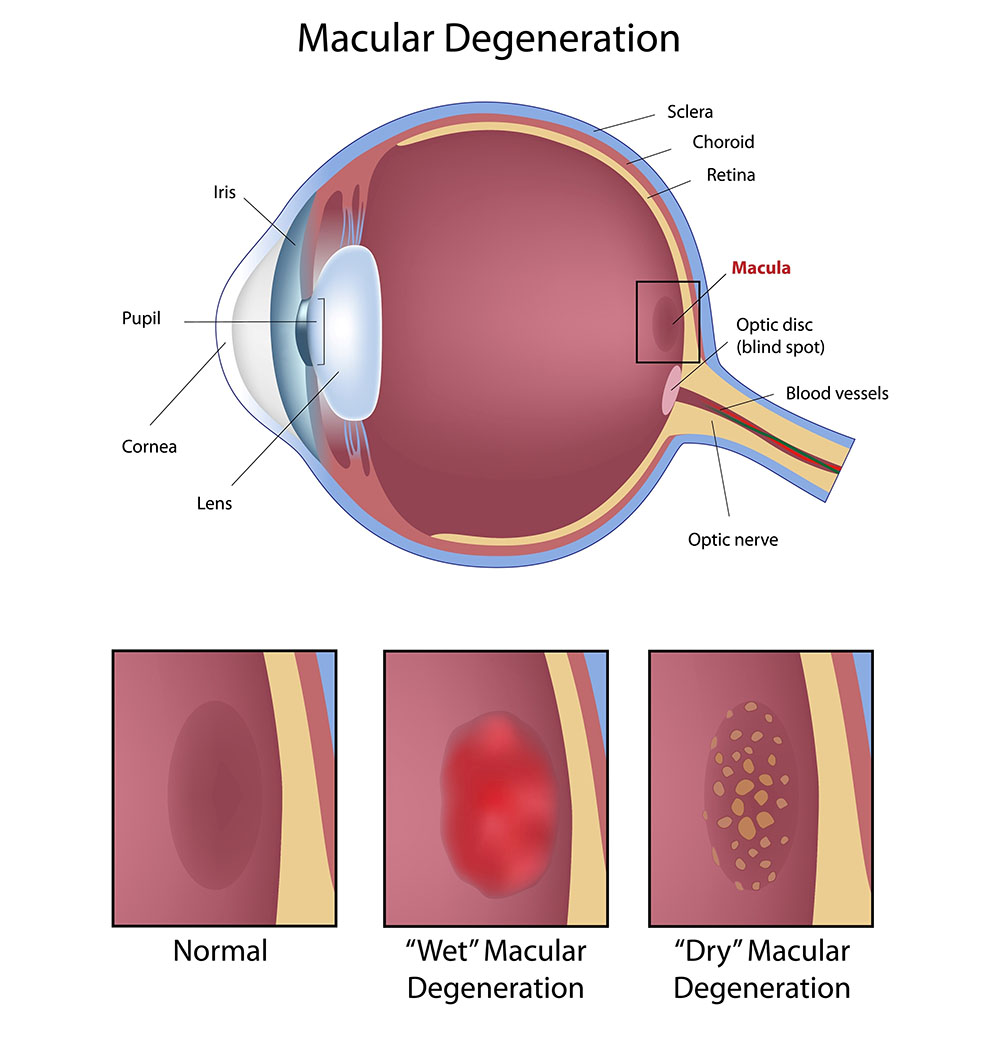When you or a loved one receives a diagnosis of macular degeneration from an eye doctor, it’s perfectly normal to have several questions and concerns. Can it be cured? What are the next steps? What, even, is macular degeneration? Having served the eye care needs of patients in West Michigan since 1982, Grand Rapids Ophthalmology has a wealth of experience and expertise from which to draw when questions like these, and any others, arise.
What is Macular Degeneration?
Let’s start with the basics – macular degeneration is an eye condition that causes deterioration in the center of the retina, an area called the macula. This is the area responsible for your near vision.
The macula can experience two kinds of deterioration:
Dry Macular Degeneration
In dry macular degeneration, yellow deposits, called drusen, appear in the macula. These deposits, which can grow larger or increase in number, can cause distorted vision. As dry macular degeneration progresses, some of the cells in the macula die off. These are in the macula’s light-sensitive layer.
Wet Macular Degeneration
In wet macular degeneration, abnormal blood vessels grow in the retina. These can leak blood and other fluids into the retina, distorting your vision.
What causes macular degeneration?
The condition is usually found in people over 60. It is sometimes referred to as age-related macular degeneration or AMD.
Besides age, other risk factors include smoking, poor diet, being overweight, or failure to control high blood pressure. There may also be genetic causes of the condition.
Scientists have yet to determine why abnormal blood vessels grow in the eye. They also don’t know what causes the drusen that results in dry macular degeneration.
What are the symptoms of macular degeneration?
Signs of macular degeneration can come on gradually. People first realize there’s a problem when their central vision seems to be worsening.
This becomes most evident when doing close-up work like reading. Straight lines may appear crooked or wavy. You may also have blind spots or see dark blurry areas.

How will I know if I have macular degeneration?
When you come in for a routine eye care appointment at any of our several locations throughout West Michigan, in addition to many other tests, your doctor will perform a thorough check to detect signs and symptoms of Macular Degeneration. In particular, he or she will check all areas of your eye, including the retina, for abnormal deposits. The doctor may then order other tests to confirm the initial diagnosis. These can include the use of an Amsler grid, which tracks daily improvement or deterioration in eyesight, as well as the administration of a special dye that allows the doctor to quickly and easily identify abnormal blood vessels.
What treatments are available?
Treatments for macular degeneration can vary, but common options include:
Drugs
The doctor can administer special medication to stop the growth of new blood vessels. This type of drug is known as an antiangiogenic drug.
High-energy laser light
These treatments can stop the abnormal growth of blood vessels in your eyes.
Light-sensitive drugs combined with laser therapy
With this procedure, a medication is injected into your bloodstream. Once this medication has been absorbed by the abnormal blood vessels in your eye, the doctor will then shine a laser light into your eye, which activates the drug and causes it to damage the abnormal cells. These treatments target wet macular degeneration. For dry macular degeneration, recent studies suggest that certain vitamin supplements may help.
If you’ve been diagnosed with dry macular degeneration, ask your doctor about this and other suggested treatments.
What steps can I take to prevent or control macular degeneration?
The easiest way to prevent macular degeneration is to live a healthy lifestyle. This includes keeping your weight down, not smoking, maintaining a healthy diet and, most importantly, having regular eye exams. This will allow your doctor to detect any changes in your eye health early.
Do you have questions or concerns about macular degeneration? Contact Grand Rapids Ophthalmology and set up an appointment with one of our highly trained ophthalmologists. Our team delivers the best eye care in Western Michigan and we look forward to helping you manage your macular degeneration.
Schedule an Appointment
Schedule an appointment today to experience the GRO difference. Call 616.588.6598 or click here.





















